#the text is from the poem “Poem” by Langston Hughes
Text
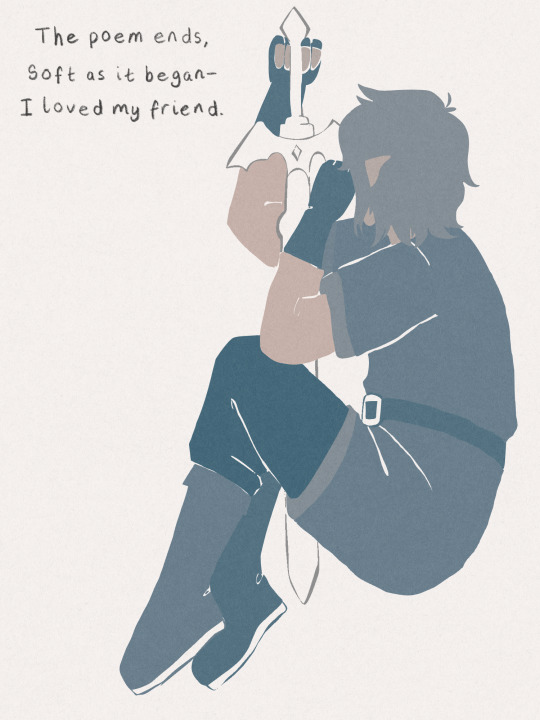
grieving
#skyward sword#link#fi#the legend of zelda#tloz#loz#my art#the text is from the poem “Poem” by Langston Hughes#first time using the lasso tool bc i tried lining this like 50 times and gave up#it was fun#skysword link#skysword
2K notes
·
View notes
Text
WELCOME TO ROUND 2 OF THE POETRY SMACKDOWN
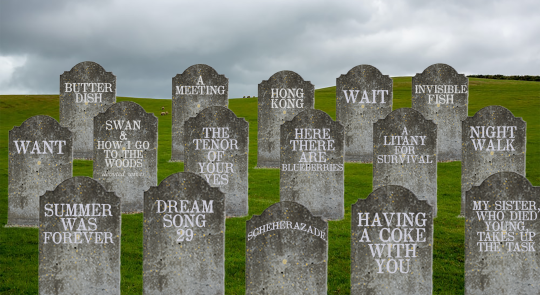
Hello again. First I just wanna say how excited I am at the response to this bracket. I was going to consider it a smashing success if like forty people voted, so needless to say it has outperformed my expectations, and I’ve really really enjoyed talking with folks and seeing everyone's responses to these poems! That said, 14/16 of my votes were in the minority, so actually fuck you guys. 🩷
Anyways Round 2! Transcriptions are included this time in alt text—sincere apologies to everyone for whom Round 1 was inaccessible, and many thanks to @army-of-bee-assassins and @accessibleaesthetics for being so generous with their helpful advice and feedback. I'm still going back and forth about whether to include just alt text or to include the image descriptions in the body of the post as well, but I've reformatted it in my drafts like twice already so at this point I'm just hitting publish and opening it up for feedback.
I've also included links to readings by the author for all the poems where one was available, for anyone interested in getting a fresh perspective.
enjoy!
-amelia @poetriarchy

ROUND 2: ENDS JULY 26th at 6pm EDT
“The Two-Headed Calf” by Laura Gilpin vs. “Poem” by Langston Hughes
"Miss you. Would like to grab that chilled tofu we love." by Gabrielle Calvocoressi vs. “Hammond B3 Organ Cistern” by Gabrielle Calvocoressi
“someone will remember us” (Fragment 147 from Sappho trans. Anne Carson) vs. “The Quiet World” by Jeffrey McDaniel
“Come. And Be My Baby” by Maya Angelou vs. “Wild Geese” by Mary Oliver
“The Orange” by Wendy Cope vs. “Instructions on Not Giving Up” by Ada Limón
“To The Young Who Want to Die” by Gwendolyn Brooks vs. “Meditations in an Emergency” by Cameron Awkward-Rich
“I’m not a religious person but” by Chen Chen vs. “How to Be a Dog” by Andrew Kane
“I’m Going Back to Minnesota Where Sadness Makes Sense” by Danez Smith vs. “Having ‘Having a Coke With You’ With You” by Mark Leidner
#round2#poetry smackdown#poetry#poll#don't ask why i'm wasting my time on these stupid graphics lol. just know it's not smart of me#masterpost
432 notes
·
View notes
Photo

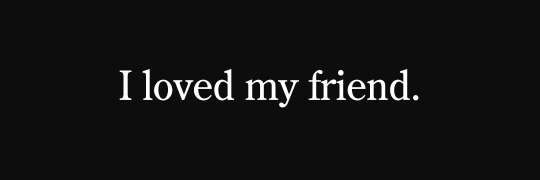



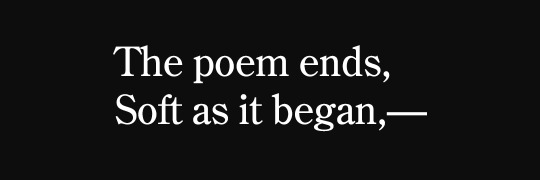


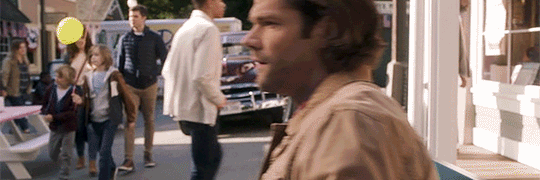
I loved my friend. — Langston Hughes
image description: scenes from “Torn and Frayed,” “All Along the Watchtower,” “Lost and Found,” “Inherit the Earth,” and “Carry On” interspersed with lines from the above poem by Langston Hughes.
8x10: Sam sits wistfully on a bench watching a couple walk past, they are holding hands and huddled under an umbrella. As another person crosses in front of him, Castiel appears sitting next to him on the bench looking pensive. Sam jumps in his seat when he notices Castiel, who pauses for a moment before saying, “Watching humanity... it never gets old, does it?”
text: [I loved my friend.]
12x23: Castiel comes through the portal to another world, breathing heavily, and Sam smiles in relief saying, “Cas!” Castiel turns to him before he is suddenly stabbed through the heart, then his eyes and mouth pour out a bright white light. Sam is shocked, and then looks terrified to see Lucifer standing behind Castiel as his body falls to the ground.
text: [He went away from me. / There’s nothing more to say.]
13x01: Sam stands with Jack in front of the pyre for Castiel and Kelly. Sam looks near tears, saying, “You hope they’re somewhere without... sadness. Or pain.” Jack takes this in, looking confused and concerned. Sam turns to him, nodding as he says, “You hope they’re somewhere better. You say goodbye.”
text: [The poem ends, / Soft as it began,—]
15x19: Dean stands in front of Sam and Jack in an empty street with several abandoned vehicles. He tells them, “Cas is gone.” Jack looks down slightly, shaking his head looking upset and lost. Sam looks away from Dean and then to Jack with short breaths, then says, “This can’t be happening.” He turns around, pulling his phone from his pockets and walking away.
text: [I loved my friend.]
15x20: At a pie festival, Sam watches a couple with two kids walk by holding hands. After, he tells Dean, “I’m not ‘Sad Sam.’” Dean raises his eyebrows, skeptically, and Sam hesitates. He explains, “I’m just... I’m thinking about Cas. Jack. If they could be here.” Dean nods and looks off as he finishes speaking.
#sastiel#sam and cas#sam winchester#castiel#jack kline#dean winchester#torn and frayed#all along the watchtower#8x10#12x23#13x01#15x19#15x20#*mine
176 notes
·
View notes
Photo

Langston Hughes, The Negro Speaks of Rivers (To W. E. B. Dubois) [The «Crisis» – A Record of The Darker Races, Vol. 22, No. 2, Whole No. 128, June 1921. Then in ’The Weary Blues’, Alfred A. Knopf, 1926], in Lament for Dark Peoples and other poems, Huib van Krimpen, Amsterdam, 1944, p. 10 (text here) [from the colophon: «Lament for Dark Peoples and other poems by Langston Hughes were selected and introduced by an amateur. This edition was printed in Linotype-Bodoni and consists of 250 copies. Apart from these 50 copies have been printed on a special paper, numbered from 1–50» [Universitaire Bibliotheken Leiden, Maatschappij der Nederlandse Letterkunde]
#graphic design#typography#poetry#book#langston hughes#w. e. b. du bois#huib van krimpen#the crisis#alfred a. knopf#universitaire bibliotheken leiden#maatschappij der nederlandse letterkunde#1920s#1940s
68 notes
·
View notes
Text


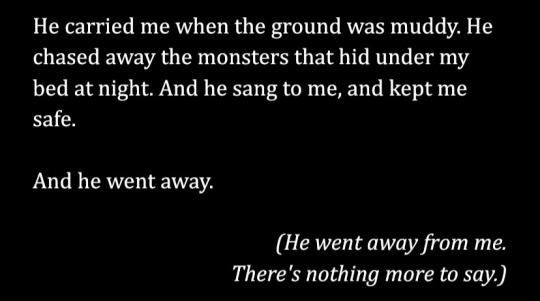

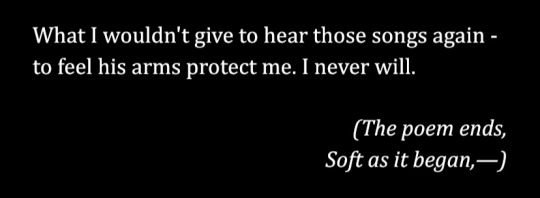
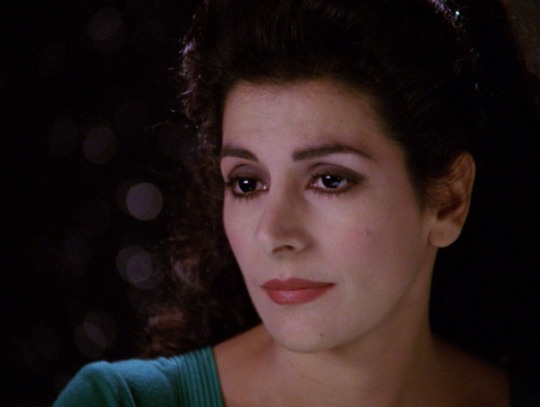


If you can feel those things...accept them. Accept the love. (The Next Generation x I Loved My Friend - Langston Hughes)
[image ids: 8 images, alternating between images of Deanna Troi from the shoulders up, and images of text of dialogue from Troi and sections of the poem I loved my friend. (1) Text that reads 'The first man I ever loved was my father. He was strong and tall. (I loved my friend.)' (2) image of Troi, looking faraway with a fond smile. (3) text: 'He carried me when the ground was muddy. He chased away the monsters that hid under my bed at night. And he sang to me, and kept me safe. And he went away. (He went away from me. / There's nothing more to say.) (4) Troi, looking soft and a bit sad. (5) Text: What I wouldn't give to hear those songs again - to feel his arms protect me. I never will. (The poem ends, Soft as it began--) (6) Troi, looking faraway in thought. (7) Text: But I can still feel his warmth and his love, as though he were here with me. (I loved my friend). (8) Image of Troi, looking fond. end id]
#star trek#the next generation#deanna troi#troi#st#tng#**#something about this little exchange#deanna troi woman you are……..i was struck by her saying he went away just like this poem#its such a neat way to sidestep the truth you know? yeah he died but he also went away. what more is there to say#cupping my hands: tng fans are you out there!!!
60 notes
·
View notes
Text
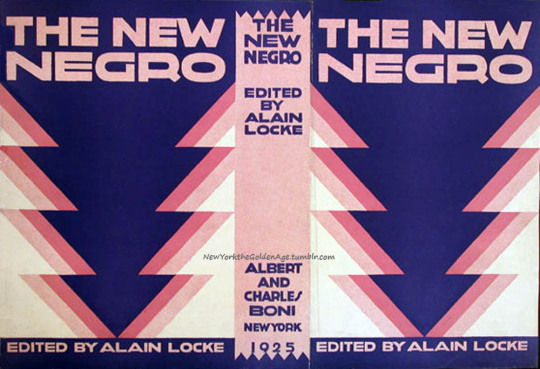
The New Negro: An Interpretation, edited by Alain Locke, cover by Winold Reiss, 1925.
The New Negro: An Interpretation (1925) was an anthology of fiction, poetry, and essays on African and African-American art and literature. It was edited by Alain Locke, the first African-American Rhodes Scholar, who obtained a Ph.D. in philosophy from Harvard and who taught at Howard University for 35 years. The book is considered by literary scholars and critics to be the definitive text of the Harlem Renaissance. It included Locke's title essay, "The New Negro," as well as nonfiction essays, poetry, and fiction by Countee Cullen, Langston Hughes, Zora Neale Hurston, Claude McKay, Jean Toomer, and Eric Walrond, among others. The anthology showed how Blacks sought social, political, and artistic change. Instead of accepting their position in society, Locke saw the "New Negro" as championing and demanding civil rights. His anthology also sought to change old stereotypes and replace them with new visions of Black identity that resisted simplification. The essays and poems in the anthology mirrored real-life events and experiences.
Photo: winoldreiss.org
#vintage New York#vintage Harlem#Harlem Renaissance#1920s#Alain Locke#The New Negro#Winold Reiss#civil rights#African-American literature#Black literature#books#social change
36 notes
·
View notes
Text
A Raisin In The Sun by Lorraine Hansberry
This play is considered revolutionary for its time; being the first drama by an African American woman to be produced on Broadway. Within the text, Hansberry crafts dialogue for the main characters by incorporating AAVE (African American Vernacular English) which flouted the expectations of plays being written in Standard English. The play was named 'A Raisin in the Sun', which was taken from lines of the poem 'Harlem' by Langston Hughes; a poem that addresses the lost American Dreams that many African Americans once had and how they are deprived of ever achieving their goals. A.R.I.T.S was truly a piece of incredible literary fiction in which I urge everyone to read.
A Raisin in the Sun is a play written by Lorraine Hansberry, an African American playwright in the 1950s. The play is set in America, specifically in Chicago during the 50s. The location is extremely necessary to understand the context as well as the plot of the play. It is a mirror to the writer, Lorraine Hansberry's own life; just like in the play, she also experienced her neighbourhood being seized under the oppressive redlining and the segregation between Black and White Americans. The play was both an acknowledgement of the social and economic deprivation that African Americans faced, as well as juggling the main theme of the American Dream between each member of the Younger family.
From initial review, being that it is a play, it was quite quick to read. I had also watched the movie after finishing the play, which starred Danny Glover who played as Walter Younger. We readers view the life of the Younger family, who are hard working and all have their own dreams to pursue. In reality, to pursue the American Dream is often thought of as following a lonely path. All of the Younger's were reaching for their own ideal, the divide in the family caused the relationships to fall apart. The Younger household had faced such desperation and discontent with their current lives that each member had their American dream relying on a single insurance check.
In the end after a big conflict, they came together as a family as they realised that they are stronger as one..it is a very heart warming and emotionally moving story…the topics of racism, religion, gender, culture assimilation and classism were very strong throughout the text. Even if you have not done research behind the context of the play, you will still be able to easily find these main themes in the text. There is an idea of hope and change that is symbolised within a plant which goes through many changes throughout the play; it is looked after by Lena, it is the heart of the family. Hansberry's A Raisin in the Sun is truly a beautiful play that emphasises the importance of family, and how our own plant will be more supported if our roots are closer together.
For ones who are not so interested in reading, I highly recommend viewing the film/TV version (1989), which stars actors such as Danny Glover as Walter Lee Younger and Esther Rolle as Mama (Lena) Younger. During this movie, I felt as though the characters I had grown fond of in the raw text had come to life in this adaption, I hope that you too will find the acting just as heart-touching.
Link: A Raisin In The Sun (1989) full movie
Link: Harlem by Langston Hughes
(1951) HARLEM
BY LANGSTON HUGHES
What happens to a dream deferred?
Does it dry up
like a raisin in the sun?
Or fester like a sore—
And then run?
Does it stink like rotten meat?
Or crust and sugar over—
like a syrupy sweet?
Maybe it just sags
like a heavy load.
Or does it explode?
#a raisin in the sun#lorraine hansberry#playwright#literary analysis#summary#literature#african american history#aave#black women#poetry#langston hughes#1950s#1950s history
2 notes
·
View notes
Photo


F1 Drivers as Poems Day 13/22—Alex Albon—“The Dream Keeper,” Langston Hughes ☁️
“Bring me all of your
Heart melodies
That I may wrap them
In a blue cloud-cloth”
Alt text for Photo 1: A photo of Alex Albon, a mid-20s Thai-British Formula 1 racer in a white Williams Racing mockneck shirt, standing in a blue hallway with lights out of focus in the background. Pastel watercolor clouds are in the top left and bottom right corners. Thin, purple-blue sans serif text in all caps reads “Alex Albon” in the top right corner.
Alt text for Photo 2: A text-based graphic on a navy background with the same watercolor clouds and driver’s name. Cream-colored serif text in the middle reads: “Bring me all of your dreams, / You dreamers, / Bring me all of your / Heart melodies / That I may wrap them / In a blue cloud-cloth / Away from the too-rough fingers / Of the world.” Thin, purple-blue sans serif text in all caps beneath the poem reads “—Langston Hughes, “The Dream Keeper”.”
Photo from Williams Racing via Formula 1
Poem: “The Dream Keeper” by Langston Hughes from The Dream Keeper and Other Poems (Alfred A. Knopf, 1932) via AllPoetry
Made with Canva
9 notes
·
View notes
Text

New entry in my junk journal, along with a longer written entry that is too personal to share. The text reads:
"I loved my friend.
He went away from me.
There’s nothing more to say.
The poem ends,
Soft as it began—
I loved my friend.
-Langston Hughes"
Rest in peace, Isaac. You were deeply loved.
7 notes
·
View notes
Text
Foundational Texts

[Image ID: A single shelf of hardcover books. The titles and authors are listed at the end of this post.]
I have been reflecting a lot lately about who I am, who I have been, and how I got from the latter to the former. Part of this process has involved collecting hardcover copies of the books that forever changed the way I view literature or changed the way I view myself.
The process isn't finished of course -- some absolutely vital books don't exist in easily accessible hardcover editions, and some books on the shelf have a more tenuous place than others.
It bears mentioning, some of the books are authored in whole or in part by people I know now to be genuine monsters. And yet, I feel that to deny their influence is to be dishonest about my own flaws, the ways I had to grow, and the ways I still have to grow. Where possible, I have acquired these books secondhand, and as with all things, I reflect on them with a critical eye.
Here, without further comment or justification, is the list at present of my Foundational Texts:
Where the Sidewalk Ends by Shel Silverstein
Things Not Seen by Andrew Clements
The Hobbit by J. R. R. Tolkien
Jurassic Park by Michael Crichton
Timeline by Michael Crichton
The Hitchhiker's Guide to the Galaxy by Douglas Adams
Ender's Game by Orson Scott Card
Speaker for the Dead by Orson Scott Card
The Things They Carried by Tim O'Brien
Fierce Pajamas edited by David Remnick and Henry Finder
The Trouble with Poetry by Billy Collins
Fried Green Tomatoes at the Whistle Stop Cafe by Fannie Flagg
The Collected Poems of Langston Hughes
Good Omens by Terry Pratchett and Neil Gaiman
Looking for Alaska by John Green
Brooklyn Burning by Steve Brezenoff
Cloud Atlas by David Mitchell
The 7 1/2 Deaths of Evelyn Hardcastle by Stuart Turton
In the Dream House by Carmen Maria Machado
0 notes
Text

eric tran, “stranger things s1e1”
[Text ID: Witness the shapeless / effigy. The stars / knocked loose / from God's mouth, / cities drained / dead of color, futile / in stop and go / monotone. I'm saying / the dogwoods / cried themselves / sterile and still / my friend is gone.]
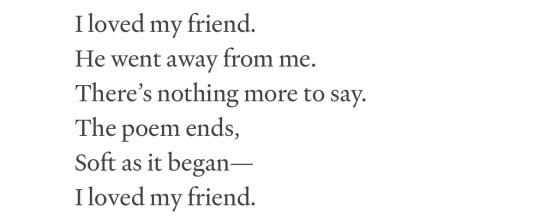
langstone hughes, "poem"
[Text ID: I loved my friend. / He went away from me. / There's nothing more to say. / The poems ends, / Soft as it began— / I loved my friend.]
#eric tran#langston hughes#words#poetry#typography#parallels#on friendship#grief is a circular staircase
1K notes
·
View notes
Text
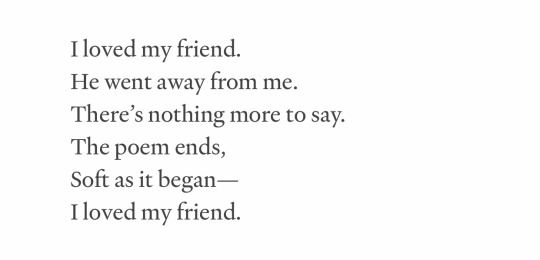

Text ID1: I loved my friend. / He went away from me. / There’s nothing more to say. / The poem ends, / Soft as it began— / I loved my friend. End ID.
Text ID2: I speak too late / It’s forevermore that I wait / Dear friend, goodbye / No tears in my eyes / [Outro] So sad it ends / As it began. End ID.
“poem” by langston hughes / white queen (as it began) - queen
#i know sooo many ppl use this poem but I noticed this connect & went loco#langston hughes#queen band#parallels#queen#lee postz#comparatives#web weaving#compilation#words#poetry#poems#lyrics#poem#love#friendship#on love#on friendship
150 notes
·
View notes
Text
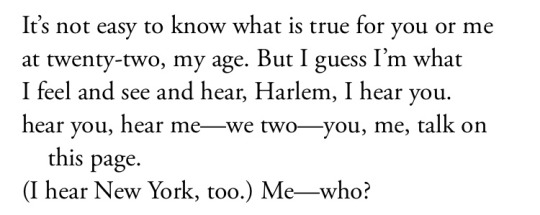
[ image id: a screenshot of a stanza from langston hughes’s “theme for english b.” there is black text on a white background
the text reads:
It’s not easy to know what is true for you or me
at twenty-two, my age. But I guess I’m what
I feel and see and hear, Harlem, I hear you.
hear you, hear me—we two—you, me, talk on
this page.
(I hear New York, too.) Me—who?
end id]
this morning in my poetry class we read this poem from langston hughes and it reminded me of kingston, and with his son being named langston i only thought it was appropriate to share
#this is the coincidence of a lifetime tbh#the shock i felt from hearing kingston call him langston was indescribable#kingston brown#dimension 20#the unsleeping city#the unsleeping city spoilers#talking#liveblog#frederick langston#described
146 notes
·
View notes
Photo
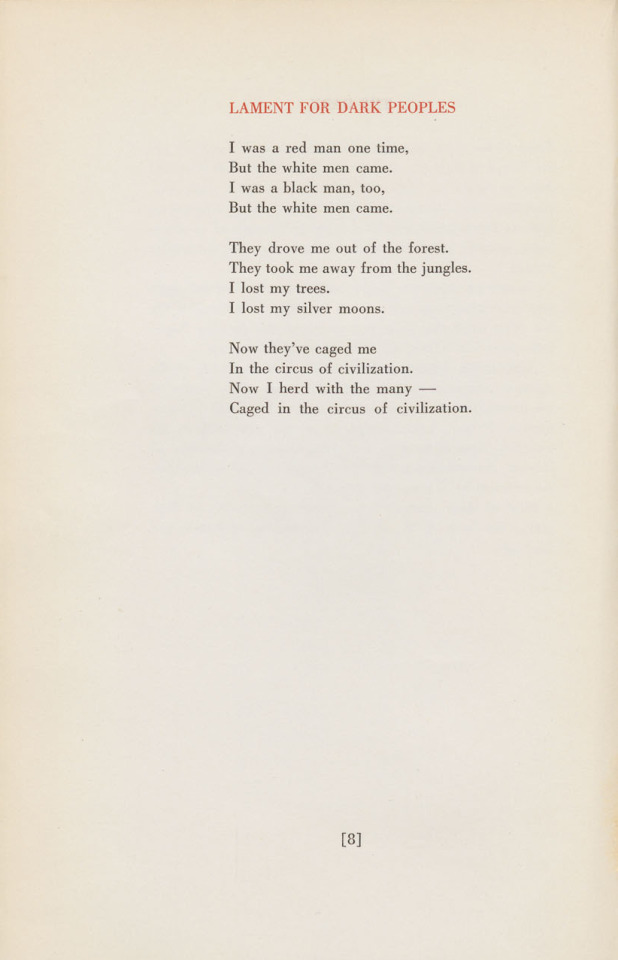
Langston Hughes, Lament for Dark Peoples [from ‘The Weary Blues’, Alfred A. Knopf, 1926], in Lament for Dark Peoples and other poems, Huib van Krimpen, Amsterdam, 1944, p. 8 (text here) [from the colophon: «Lament for Dark Peoples and other poems by Langston Hughes were selected and introduced by an amateur. This edition was printed in Linotype-Bodoni and consists of 250 copies. Apart from these 50 copies have been printed on a special paper, numbered from 1–50»] [Universitaire Bibliotheken Leiden, Maatschappij der Nederlandse Letterkunde]
#graphic design#typography#poetry#book#langston hughes#huib van krimpen#alfred a. knopf#universitaire bibliotheken leiden#maatschappij der nederlandse letterkunde#1920s#1940s
36 notes
·
View notes
Text
Black History Month Public Domain Reading List
I’d seen a list floating around the internet with links to pirated books by black writers of note for black history month. I felt that it was problematic to be sharing something that’s disenfranchising black writers when there are a lot of great books by black writers to read that are in the public domain and free to read. I compiled this list of books by various black writers of note with descriptions and links to a site to download them onto your devices. The site is Project Gutenberg, the original e-book site, releasing ebooks since, surprisingly, 1971.
Slave Narratives & Other Writings
Up from Slavery: An Autobiography by Booker T. Washington (A Memoir). This is his personal experience of having to work to rise up from the position of a slave child during the Civil War, to the difficulties and obstacles he overcame to get an education at the new Hampton Institute, to his work establishing vocational schools—most notably the Tuskegee Institute in Alabama—to help black people and other disadvantaged minorities learn useful, marketable skills and work to pull themselves, as a race, up by the bootstraps. It’s worth knowing that Washington was a segregationist, and so some of his views may surprise modern readers. http://www.gutenberg.org/ebooks/2376
Narrative of the Life of Frederick Douglass, an American Slave by Frederick Douglass (A Memoir). It is generally held to be the most famous of a number of narratives written by former slaves during the same period. In factual detail, the text describes the events of his life and is considered to be one of the most influential pieces of literature to fuel the abolitionist movement of the early 19th century in the United States. http://www.gutenberg.org/ebooks/23
Narrative of William W. Brown, a Fugitive Slave by William Wells Brown (A Memoir). A wonderfully gripping slave narrative that’s the length of a novella. The matter-of-fact, almost journalistic way in which the writer describes the horrors he saw and experienced really hits home. http://www.gutenberg.org/ebooks/15132
Clotelle; Or, The Colored Heroine, a tale of the Southern States; Or, The President’s Daughter by William Wells Brown (A Novel). This book tells a fictional story of what the life would be like for the mixed-race daughter of founding father and president Thomas Jefferson and slave Sally Hemings. http://www.gutenberg.org/ebooks/241
The Souls of Black Folk by W. E. B. Du Bois (Essays). The book contains several essays on race, some of which the magazine Atlantic Monthly had previously published. To develop this work, Du Bois drew from his own experiences as an African American in American society. Outside of its notable relevance in African-American history, The Souls of Black Folk also holds an important place in social science as one of the early works in the field of sociology. In The Souls of Black Folk, Du Bois used the term "double consciousness", perhaps taken from Ralph Waldo Emerson ("The Transcendentalist" and "Fate"), applying it to the idea that black people must have two fields of vision at all times. They must be conscious of how they view themselves, as well as being conscious of how the world views them. http://www.gutenberg.org/ebooks/408
Poems on Various Subjects, Religious and Moral by Phillis Wheatley (Poetry). She was the first African-American author of a published book of poetry. Born in West Africa, she was sold into slavery at the age of seven or eight and transported to North America. She was enslaved by the Wheatley family of Boston. After she learned to read and write, they encouraged her poetry when they saw her talent. On a 1773 trip to London with her master's son, seeking publication of her work, Wheatley met prominent people who became patrons. The publication in London of her Poems on Various Subjects, Religious and Moral on September 1, 1773, brought her fame both in England and the American colonies. Figures such as George Washington praised her work. A few years later, African-American poet Jupiter Hammon praised her work in a poem of his own. Wheatley was emancipated by her masters shortly after the publication of her book. They soon died, and she married poor grocer John Peters, lost three children, and died in poverty and obscurity at the age of 31. http://www.gutenberg.org/ebooks/409
Alexandre Dumas’ Writings
Many don’t know this, but he was the grandson of a French Nobleman and a Haitian slave woman. Writing in the 1800’s, his work is characterized as adventure novels and page-turners with beautiful descriptions that rarely steal the show from the plot.
The Three Musketeers by Alexandre Dumas is a standalone book that sets up his D'Artagnan Romances (pronounced Dar-tan-yun, by the way). Romantic in the sense of vivid and sentimental in tone, the stories have captivated generations all over the world. https://www.gutenberg.org/ebooks/1257
The Count of Monte Cristo (Illustrated) by Alexandre Dumas is one of the best adventure tales of revenge that spans decades, as our hero unfolds a tale of revenge that includes prison breaks, fabulous wealth, hedonism, and much more. https://www.gutenberg.org/ebooks/1184
The Black Tulip by Alexandre Dumas is one of his shorter novels that takes place amid murder and intrigue in a world where tulips were more valuable than gold. A good read, but not as gripping as the above two books, but great if you don’t want to be on the hook for a thousand pages of description and action. https://www.gutenberg.org/ebooks/965
Zora Neale Hurston’s Writings
She was an American author, anthropologist, and filmmaker. She portrayed racial struggles in the early-1900s American South and published research on hoodoo. The most popular of her four novels is Their Eyes Were Watching God, published in 1937. She also wrote more than 50 short stories, plays, and essays. Her writings are known for their noticeable focus on vernacular speech, where character spoke as they would during that place and time.
Three Plays by Zora Neale Hurston (Lawing & Jawing, Forty Yards, & Woofing). Lawing and Jawing is about a "regal" Judge who having a rough morning sends everybody to jail. He adjourns the court so he can "escort" a pretty girl home since he sent her innocent boyfriend to jail. Forty Yards is all about the teams cheering and singing. Every step is a song. The game is just an excuse to sing, even when the place catches fire they sing. Woofing is about a procrastinating man who doesn't finish anything and when a marching band goes past his porch, he and all his cronies drop everything to follow the band. http://www.gutenberg.org/ebooks/17187
The Mule-Bone: by Langston Hughes and Zora Neale Hurston. (Novella) The only collaboration between the two brightest lights of the Harlem Renaissance—Zora Neale Hurston and Langston Hughes. In this hilarious story, Jim and Dave are a struggling song-and-dance team, and when a woman comes between them, chaos ensues in their tiny Florida hometown.
http://www.gutenberg.org/ebooks/19435
De Turkey and De Law by Zora Neale Hurston. The two friends from The Mule-Bone, Jim and Dave are back again and so is Daisy. These two friends become enemies because they both imagine that Daisy prefers himself over the other. They both go out to hunt a turkey to give Daisy. The two young men fight over the turkey and one gets hit with a mule bone from the same old mule from the other play.
http://www.gutenberg.org/ebooks/22146
#zora neale hurston#alexandre dumas#booker t washington#frederick douglass#william wells brown#sally hemmings#thomas jefferson#w.e.b. du bois#Phillis Wheatley#black history month#black writers#project gutenberg
44 notes
·
View notes
Text
For Olivia | Chapter Two
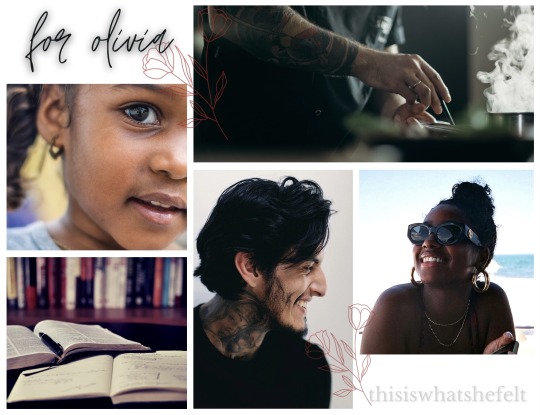
Summary: Line cook Johnny “Coco” Cruz has made many bad decisions in his life, but his biggest regret is not being a part of his children’s lives. He reconciles with his teenage daughter, Letty, so he’s hopeful when he shows up on his four-year-old daughter’s doorstep. Shanice Hunter, a newly-appointed guardian, is determined to protect Olivia from anything— even if that means her own father.
Pairing: Chef!Coco x Black!OC
Previous Chapter: One
Warnings: This chapter kind’ve deals with a deadbeat parent, but we’re still in fluffy territory for now.
Word Count: 2.7k

Chapter Two
~Six months ago~
Mel calls from outside the apartment the night. She’s at the door wearing the same smudged eyeliner she left with two days before, but she’s replaced her party dress with cheap, baggy clothing that are three times too big for thin frame. Her once flat ironed hair is reverting at the edges of her hairline. Shanice quietly eases outside so they can sit together on the steps.
“Do you remember when I first had her, and I begged you to take her? You promised me that I would learn. That I would get it right.” Mel rings the sweatshirt between her hands as if squeezing water from the fabric. Her hands become dryer between her fingers and at the knuckles the more she works her hands. “I’ve never gotten it right, ‘Nice. Not one time, so I’m asking you again–Please. Just until I get it together. I have to figure something out.”
Shanice sees how exhausted Mel appears in this moment. The weight of something more than two sleepless nights darken under her eyes. She’s never looked this tired. “What happened over there?”
She smiles even though there are tears falling from her eyes. “What happens in Vegas…” Shanice just stays silent, looking at her friend. Seeing the fracture splinter out even more. When she reaches out to pull Mel’s hand away from the bedraggled clothing, Mel’s lip begins to tremble. “He took everything, ‘Nice. Maxed out all my credit cards before I even realized he wasn’t coming back to the hotel room. A-All my jewelry, I don’t…”
“Oh, Mel,” Shanice says, and it’s all she can say as she moves herself closer to embrace the scared woman. “You can stay here with me until-”
“No, I can’t,” Mel objects, shaking her head and pulling away like she’s been burned. Shanice is about to insist, but Mel’s hand between them quells anymore protests. “I can’t. I have to do this on my own. Will you take her? It would just be until she starts Kindergarten–”
“Of course, Mel. I love her.”

The wrinkled paper, which she realizes is torn from a roll of receipt paper, now sits taut between her pinched fingers. It had his name and number scrawled on one side in handwriting that didn’t look that much different from the scribbling Olivia brings home from preschool.
Shanice doesn’t sleep well after Johnny appears on the doorstep. She doesn’t even leave Olivia’s bed when the bedtime stories end. For hours, she lays beside the girl, recalling past conversations she’d had with her best friend.
It feels strange to still call her ‘best friend’ now, though. Life divides Shanice and Melanie’s paths after college, but they regain closeness once Mel suddenly becomes pregnant and names Shanice the godmother. Shanice plays guardian even before Olivia is born, making sure Mel takes her prenatal vitamins and makes sure she keeps up with her doctor visits.
Now Shanice lays beside the girl so that their noses are almost touching, but her legs are too long for the mattress, so she has to tuck her knees up to fit. Loose strands of Olivia’s tight chestnut curls fall onto her eyelashes and Shanice tucks the strand back into one of her plaits.
Most people assume they’re related in some way because of how superficially similar they appear in passing. Shanice’s deep skin is just a few shades darker than Olivia’s tawny complexion. Their dark hair zig zags in soft, defiant halos when let out of the confines of twists or braids, but Mel is right there at the middle of Olivia’s face.
The bridge of her nose slightly widens before sloping into a rounded tip and it’s all Mel. Shanice leans in close to take in all of her scent before kissing her between the eyes and watching her breathe until sleep finally claims them both.
In the morning, Shanice is uncharacteristically sluggish, but that changes with her first cup of coffee. The morning ritual is completed with most of her mind on autopilot as Olivia talks at a million miles an hour through outfit changes and getting her hair styled into two French braids.
Shanice doesn’t realize she hasn’t been listening to most of the little girl’s one-sided conversation until the waffles pop up in the toaster. She juggles the hot waffles out of the machine and onto a plate before adding syrup and sliding it across the counter.
“Can we go?” Olivia taps her fingers on the counter, strumming her stubby fingers against the countertop.
“Wait, go where?” Shanice’s eyebrows knit together. She tries to recall the last few moments, but her mind is still on last night. The man at the door, and the panic she feels even as her face remains even. Coffee is a bad idea, but she’s now on her second cup.
“Can we go to the big park today. Please?”
“Funny,” Shanice says sarcastically. “I told you we could go this weekend, Mushroom, and it’s still–” Shanice makes a show of looking at her smart watch before her eyes land back on Olivia. “–yep, just what I thought. It’s still Thursday morning.”
Olivia clasps her hands together and squints her eyes as she squeaks out, “Pleeeeease-”
“Hey, hey, hey…ma’am.” Shanice isn’t very loud, but her words cut through just sharp enough to make a point. Olivia knows Shanice doesn’t tolerate whining and begging, so the little girl does the next best thing. Her shoulders slumped exaggeratedly, and like a sucker, Shanice falls for it as she quietly sighs. “If I get a good report from Ms. Wendy today, we can go to the playground at your school.”
“Kay!” Olivia’s eyes widen excitedly. “Can you tell mommy to come too?”
She can’t say that she’s been trying to call Mel all night, but the phone rings until the automated voicemail picks up. She wants her to pick up and ask how Johnny has her home address. It was better that the phone did go to voicemail because the conversation probably wouldn’t have been pleasant.
“I’m sure she’s gonna try her best to make it,” Shanice tells her just as her own waffles finish in the toaster. As she sips her coffee, she watches in slight disgust as Olivia smashes her bananas into each crevice of her waffles. “What’re you doing?”
“Makin’a waffles smooth.” Olivia fills some of the squares with the mashed bananas and takes a bite. “Want some?”
“Noooo thank you,” Shanice says, fervently shaking her head with a laugh. “I like my waffles with all the holes.”
After dropping Olivia off at preschool, Shanice makes her way to Damon Pope High School where she spends the first two periods with 9-12 graders, teaching them about the Harlem Renaissance before analyzing some poems by Countee Cullen and Langston Hughes. Teaching is exciting because she is always amazed at how astute these teenagers were with their analyzations. And their poetry is often some of the most beautiful she’s ever read. She’s excited to see the entries for the poetry contest this year.
At a free period, she shuts herself up in her classroom and tries Mel’s cell again. It goes straight to voicemail, and Shanice’s anger transforms into concern. She leaves another message, hoping for the best but thinking of the worst.

Shanice makes her way to Olivia’s preschool twenty minutes after the last bell rings and is there just as the first parents are leaving with their children. She’s soon inside and makes small talk with some of the parents and grandparents.
Olivia spots her and yells across the room of children and adults. “Aunty ‘Nice!” Olivia rushes over and grabs her hand before pulling her back over to the teacher, Ms. Wendy. “Tell her I was good, Ms. Wendy! Tell her!”
“Olivia…” Shanice tries to reprimand, but she finds herself biting her bottom lip to keep from smiling.
Ms. Wendy doesn’t hold in her laugh, and her wavy blonde hair dances with every shake of her shoulders. “Well, Olivia is always good, but she was extra special today.”
Olivia is beaming, but Shanice tries not to roll her eyes as she sees the little girl grinning. They say their goodbyes and walk outside to the playground where Olivia runs immediately to the slides. Shanice picks up Olivia’s backpack from the grass where it sits abandoned in the excitement and stands off to the side to make another phone call. The phone doesn’t answer but she gets a text message a few minutes later.
Hey girl. Got your messages! Been really
busy lately but I’ll be over ltr tonight.
Tell Liv I got her a present!! Xo
Shanice decides not to tell Olivia about the text message because she’s heard this before. She spends time with Olivia who looks up every time someone walks near the playground, hoping one of them will be Mel, but she doesn’t actually ask about her mother. There’s a destructive amount of hope in her eyes that dies with every passing moment.
There’s that hope Mel will show even at eight that night when Olivia is fast asleep. Shanice still has hope, but she knows it won’t happen.
I have something important to
talk about, Mel. It’s about
Olivia’s bio dad.
At ten, Shanice’s phone buzzes in the middle of grading assignments.
Sorry! Forgot 2 tell u I gave Johnny
yur address! I didn’t know what
to tell him. figured you would
know what 2 do??
Is Liv upset I didn’t show?? Tell
her I’ll be there in a couple days xo
Shanice is so angry that she only replies with
She’s fine.
before tossing her phone on the other side of the couch.
It’s more than sending a complete stranger to her home. It’s more than ignored calls.
Figured you would know what to do.
But Shanice doesn’t know what to do. She really wants to keep Mel included in their life. Keep her included in the decisions she has to make for Olivia, but Shanice is slowly accepting that she’s alone in this now. She can’t keep playing the role of a glorified babysitter.
The piece of paper is still on the night table when she goes back to retrieve it. Her emotions are driving her as she paces back to the couch to retrieve her discarded phone, so she doesn’t realize how late it is until she hears the groggy voice pick up.
“Yeah, hello?” he answers.
“I-I’m sorry,” Shanice says now caught off guard. It’s nearly midnight. “Is this Johnny?”
“Yeah, who’s this?”
“It’s Shanice,” she tells him. “Can we meet?”

Shanice pulls her car into the Tres Reyes lot during her a free period the next morning. It’s a quaint white building with a terracotta roof that looks almost like someone’s home, if not for the large sign on the face of the building in bold letters.
Once inside the diner, she can feel the warmth from the kitchen blanket every bit of her skin, but it isn’t as oppressive as the heat from the California desert. The white from the outside also paints the wall inside, but there are bright Spanish tiles on the floor which makes Shanice feel like she’s stepping on artwork. She also now feels wildly overdressed in her pencil skirt, blouse and heels.
A few older Latino people are scattered throughout the diner while some college kids occupy most of the other tables.
“Cuántos personas?” a teenage girl asks, coming from behind a desk near the door. Shanice fights the teacher in her that wants to ask, Shouldn’t you be in class?
“Uh, dos personas, por favor,” Shanice replies, quickly recalling something from her Freshman year at college.
The girl asks in Spanish, gauging whether or not she speaks the same language and by her accent, the girl nods. With a quick, disapproving twitch of her eyebrows that only a teenager can manage, she says, “Right this way.”
“Are you waiting for Coco?” the girl asks, nonchalantly placing two menus on the table.
“I…I mean, I’m waiting for Johnny?”
She nods again then turns slightly in the direction of the service window that separates the kitchen from the dining. “Coco!”
A few of the guests jump at the girl’s voice. Johnny walks from the kitchen, chastising her with his eyes. She shrugs back with an impressive lack of enthusiasm. “My bad, alright?” she apologizes, returning to her hostess spot behind the counter.
It makes sense now why Johnny wants to meet here. Shanice had assumed he’d be a guest, not an employee. He sits at the table across from her with a shy smile. He’s wearing a short-sleeved white t-shirt, so she can clearly see that his tattoos wrap the full lengths of his arms.
Unsure of how else to begin, Shanice opens with, “They call you Coco?”
“Only people that really call me Johnny is my mom when I piss her off,” he says, smiling slightly. “Thanks for meeting me, I really appreciate it.”
“Don’t thank me yet,” Shanice mutters.
“You want something to eat?”
“Thanks, but I have to get back to work in a little bit.” She sighs then decides to do away with pointless small talk. “She’s four years old now. Where’ve you been?”
Straight to the point. The question visibly unsettles him, but she’s past caring.
Johnny–or Coco sits up a little straighter in the seat. “I’m gonna keep it real with you. I been in and outta prison most of my life–nothing violent, but I got locked up a couple months before she was born and was in for the first two years of her life.”
Shanice suspects as much, so she isn’t shocked when he admits this. She’s more concerned with what lands him there. “Define…‘nothing violent?’”
He clears nothing from his throat, “Possession.” The words roll out of his mouth like a secret, but it falls between them like an anchor at the bottom of a chasm.
She nods once. Coco’s anxious, almost like the kids she has to chastise for not doing their homework. The fact that he’s been to prison doesn’t exactly make her flinch. She has a few relatives that had been incarcerated at one point in time and others that are still in jail. Had it not been for pure luck, she could have ended up the same way at a young age. Especially during her college days with Mel.
Shanice can’t help but be hard. It must feel like an interrogation the way she fires questions and sits emotionless on the other side of the table. “That’s still two years unaccounted for.”
“Honestly,” he said with a wince, “I thought she’d be better off without me there. Being a good father isn’t something I know how to be.”
“What makes you so sure you can be a good father now?”
“Nothing,” he says plainly. “But I remember how I felt growing up without my dad. I didn’t feel wanted. I don’t want her to feel something like that. Especially not ‘cause of me.”
“There’s an audience,” she notes with her gaze set upon the service window.
He turns to the men. One is older with white hair and shadows of old acne scars on his somber face. One of the younger men sports an undercut while the other has his hair shortly cropped. By the downturned eyes the three share, it’s obvious that the three are father and sons.
The older man adjusts his glasses and disappears into the kitchen when he realizes he’s been caught leering. The other two put their heads down and start scrubbing away at the tiles in the window with small towels.
Shanice focuses again at her table mate and stares at him for just a moment much too long for it to be deemed comfortable. She notices his fingers are tapping against the table, and she suddenly recalls a moment from that morning when Olivia does the same.
It’s a different beat, but it has the same heart.
“Okay,” she tells him, looking up, and she watches Coco break out into a boyish smile. “Let me get something straight, though. There’s no ‘try’ in this. She’s had people in her life disappoint her, and at her age, she hasn’t really learned to stop being hopeful.”
“Thank you,” he smiled, revealing a familiar dimple.
“We’re going to the park downtown this Sunday. You can meet us there if you don’t have to work.”
“Yeah,” he said, still smiling. “Of course, I’ll be there.”
Shanice is driving back to school a few minutes later, chewing on the realization that it will most likely be another sleepless night.
_______
Next Chapter: Three
#mayans mc#mayans mc fanfiction#mayans fanfic#mayans fanfiction#coco cruz#johnny cruz#coco x oc#thisiswhatshewrote#poc!fanfiction#poc!fanfic#woc writer#poc writer#black oc#mayans mc x oc
47 notes
·
View notes